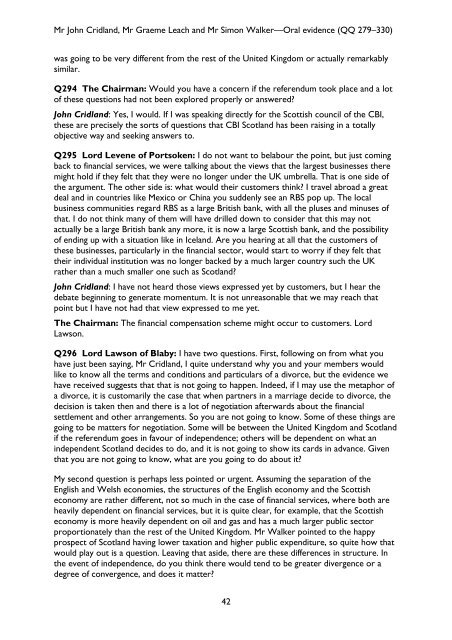SELECT COMMITTEE ON ECONOMIC AFFAIRS - Parliament
SELECT COMMITTEE ON ECONOMIC AFFAIRS - Parliament
SELECT COMMITTEE ON ECONOMIC AFFAIRS - Parliament
You also want an ePaper? Increase the reach of your titles
YUMPU automatically turns print PDFs into web optimized ePapers that Google loves.
Mr John Cridland, Mr Graeme Leach and Mr Simon Walker—Oral evidence (QQ 279–330)<br />
was going to be very different from the rest of the United Kingdom or actually remarkably<br />
similar.<br />
Q294 The Chairman: Would you have a concern if the referendum took place and a lot<br />
of these questions had not been explored properly or answered?<br />
John Cridland: Yes, I would. If I was speaking directly for the Scottish council of the CBI,<br />
these are precisely the sorts of questions that CBI Scotland has been raising in a totally<br />
objective way and seeking answers to.<br />
Q295 Lord Levene of Portsoken: I do not want to belabour the point, but just coming<br />
back to financial services, we were talking about the views that the largest businesses there<br />
might hold if they felt that they were no longer under the UK umbrella. That is one side of<br />
the argument. The other side is: what would their customers think? I travel abroad a great<br />
deal and in countries like Mexico or China you suddenly see an RBS pop up. The local<br />
business communities regard RBS as a large British bank, with all the pluses and minuses of<br />
that. I do not think many of them will have drilled down to consider that this may not<br />
actually be a large British bank any more, it is now a large Scottish bank, and the possibility<br />
of ending up with a situation like in Iceland. Are you hearing at all that the customers of<br />
these businesses, particularly in the financial sector, would start to worry if they felt that<br />
their individual institution was no longer backed by a much larger country such the UK<br />
rather than a much smaller one such as Scotland?<br />
John Cridland: I have not heard those views expressed yet by customers, but I hear the<br />
debate beginning to generate momentum. It is not unreasonable that we may reach that<br />
point but I have not had that view expressed to me yet.<br />
The Chairman: The financial compensation scheme might occur to customers. Lord<br />
Lawson.<br />
Q296 Lord Lawson of Blaby: I have two questions. First, following on from what you<br />
have just been saying, Mr Cridland, I quite understand why you and your members would<br />
like to know all the terms and conditions and particulars of a divorce, but the evidence we<br />
have received suggests that that is not going to happen. Indeed, if I may use the metaphor of<br />
a divorce, it is customarily the case that when partners in a marriage decide to divorce, the<br />
decision is taken then and there is a lot of negotiation afterwards about the financial<br />
settlement and other arrangements. So you are not going to know. Some of these things are<br />
going to be matters for negotiation. Some will be between the United Kingdom and Scotland<br />
if the referendum goes in favour of independence; others will be dependent on what an<br />
independent Scotland decides to do, and it is not going to show its cards in advance. Given<br />
that you are not going to know, what are you going to do about it?<br />
My second question is perhaps less pointed or urgent. Assuming the separation of the<br />
English and Welsh economies, the structures of the English economy and the Scottish<br />
economy are rather different, not so much in the case of financial services, where both are<br />
heavily dependent on financial services, but it is quite clear, for example, that the Scottish<br />
economy is more heavily dependent on oil and gas and has a much larger public sector<br />
proportionately than the rest of the United Kingdom. Mr Walker pointed to the happy<br />
prospect of Scotland having lower taxation and higher public expenditure, so quite how that<br />
would play out is a question. Leaving that aside, there are these differences in structure. In<br />
the event of independence, do you think there would tend to be greater divergence or a<br />
degree of convergence, and does it matter?<br />
42

















